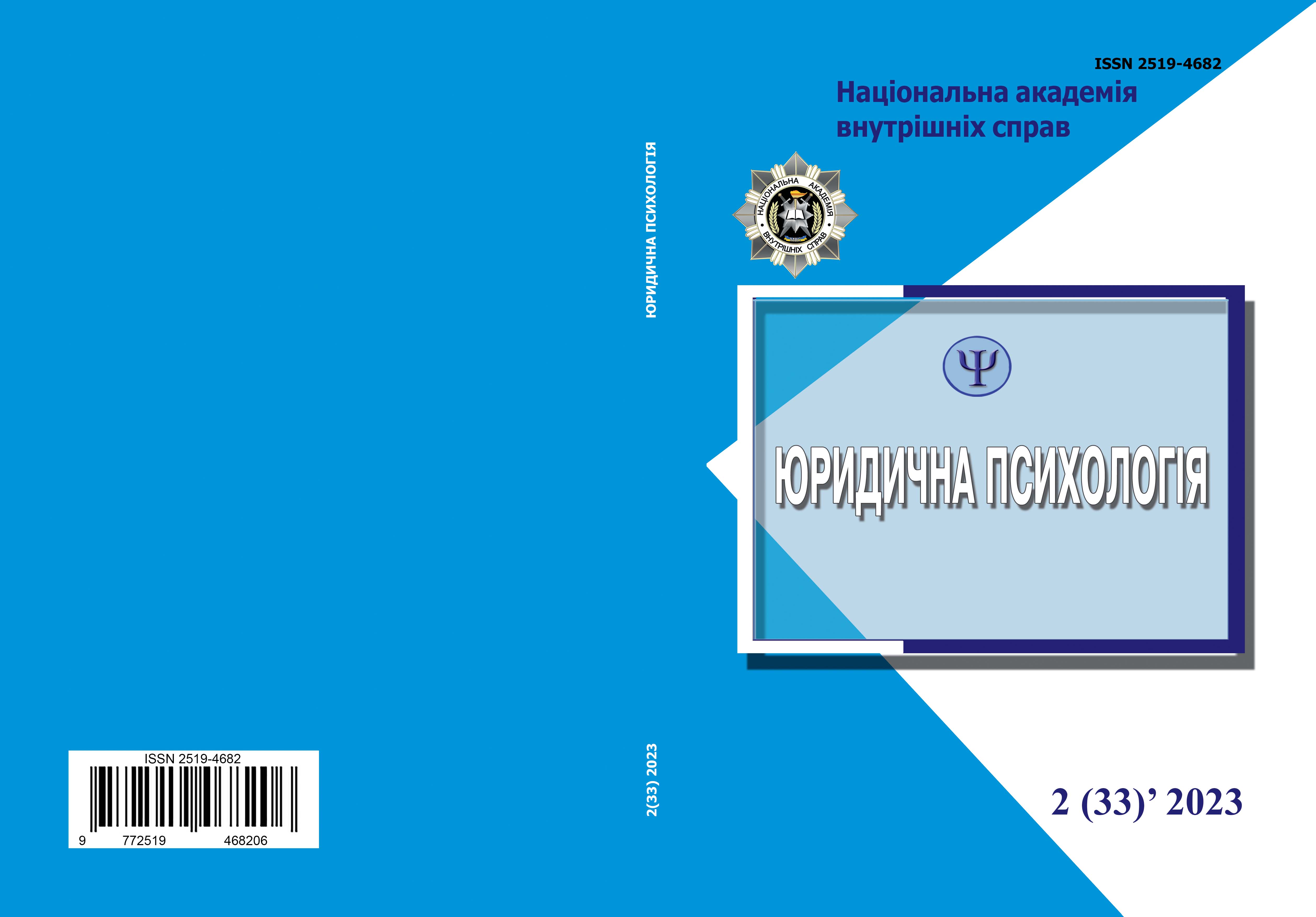Personal Transformations in Psychology: Differentiation of the Conceptual Apparatus of Research
Abstract
Abstract. The purpose of the article is a theoretical study within the limits of psychological knowledge of the conceptual apparatus of research into the essence and dynamics of personality transformation. It is determined that in the subject field of psychology, the problem of transformation is poorly studied and quite debatable. The analysis of the transformation concept is determined by its integrative, interdisciplinary nature as well as complexity of the content and multifaceted dimension. Summarizing the available studies in the field of domestic psychology allows us to state that the majority of them are devoted to the problem of personality transformations as a consequence of overcoming various types of crises; the transformation process in them is associated with the process of self-development of the individual. In existing studies, the problem of self-development is considered mainly in the evolutionary direction of personality changes, which involves directing a person to self-improvement and cultivation of his own potential. It is determined that the identification of transformation exclusively with self-development is not balanced, since the development of the personality can take place in an inlutionary direction and be accompanied by negative changes in its content component. It can be argued that the majority of foreign scientists identify the term «transformation» as changes in characteristics and traits and mostly associate them with a classic five-factor (six-factor) personality model.
Keywords: personality transformation; personality changes; personality development; self-development; dynamics of personality transformations.
Downloads
References
Asselmann, E., Klimstra, T.A., & Denissen, J.J. (2021). A. Unraveling resilience: Personality predicts exposure and reaction to stressful life events. Personality Science, 2, 1-29. doi: 10.5964/ps.6055.
Biliuk, O.H. (2017). Personal transformations of future psychologists in the educational process of universities. Scientific Bulletin of Mykolaiv National University named after V.O. Sukhomlynskyi, 1(17), 23-27.
Fassbender, I., Haehner, P., Buecker, S., & Luhmann, M. (2022). Perceived Characteristics of Life Events-Short-Term Changes in Prosociality and Empathy? European Journal of Personality, 36(4), 529-542. doi: 10.1177/08902070211031762.
Fedan, O.V. (2017). Theoretical approaches to the problem of self-development of personality. Theoretical and applied problems of psychology, 2, 201-210.
Forgeard, M., Roepke, A.M., Atlas, S., Bayer-Pacht, E., Björgvinsson, T., & Silvia, P.J. (2022). Openness to experience is stable following adversity: A case-control longitudinal investigation. European Journal of Personality, 36(4), 483-506. doi: 10.1177/08902070221076902.
Gander, F., & Wagner, L. (2022). Character Growth Following Collective Life Events: A Study on Perceived and Measured Changes in Character Strengths During the First Wave of the COVID-19 Pandemic. European Journal of Personality, 36(4), 466-482. doi: 10.1177/08902070211040975.
Haehner, P., Bleidorn, W., & Hopwood, C.J. (2023). Examining individual differences in personality trait changes after negative life events. European Journal of Personality. 2023. doi: 10.1177/08902070231156840.
Hornostai, P.P., & Tytarenko, T.M. (Eds). (2001). Personality psychology. Kyiv: Ruta.
Ivchenko, Ye.A. (2015). Transformation as a concept and approaches to its understanding in the economic context. Efficient economy, 2, 82-87.
Jayawickreme, E., Infurna, F.J., Alajak, K., Blackie, L.E., Chopik, W.J., Chung, J.M., & Zonneveld, R. (2021). Post‐traumatic growth as positive personality change: Challenges, opportunities, and recommendations. Journal of Personality, 89(1), 145-165. doi: 10.1111/jopy.12591.
Kudermina, O.I. (2012). Psychology of the individual as a subject of law enforcement activity. Chernivtsi: Nashi kn.
Laceulle, O.M., Özoruç, Ö., Zonneveld, R., Rahim, H., Mooren, T., Stellar, J., & Chung, J.M. (2022).
A longitudinal study of dispositional compassion in Syrian origin young adults resettling in The Netherlands. European Journal of Personality, 36(4), 543-558. doi: 10.1177%2F08902070221081316.
Lushyn, P.V. (2002). Psychology of personal change (Doctoral thesis, Kyiv, Ukraine).
Maksymenko, S.D., Kuzikova, S.B., & Zlyvkova, V.L. (Eds.). (2017). Personality as a subject of overcoming crisis situations: psychological theory and practice. Sumy: Sumy DPU im. A.S. Makarenko.
Onyshchenko, V.M. (2020). Transformation of personality in the process of overcoming life crises. Actual problems of psychology, 56, 118-124.
Pochenchuk, H.M. (2014). Patterns of transformational processes of the national economy. Economic analysis, 16(1), 123-129.
Ponomarenko, L.P., & Belousova, R.V. (2000). Basics of psychology for high school students. Practical Psychology and Social Work, 5, 17-21, 7, 22-23, 8, 12-13.
Radionova, O.M. (2014). Employment in big cities: modern economic and theoretical analysis. Kharkiv: KhNUMH.
Shtepa, O.S. (2004). Transformation of personality in personal growth trainings and methods of its measurement. Practical Psychology and Social Work, 3, 53-57.
Tytarenko, T.M. (2023). Personality navigation in traumatic life circumstances: landscapes of life creation. Ukrainian psychology of the 21st century. The beginning (Days of Ukrainian psychology in Berlin): scientific and practical materials conference from international with participation (pp. 45-49). V.H. Panka (Eds.). Kyiv.
Weststrate, N.M., Jayawickreme, E., & Wrzus, C. (2022). Advancing a three-tier personality framework for posttraumatic growth. European Journal of Personality, 36(4), 704-725. doi: 10.1177/08902070211062327.
Zaika, V.M. (2006). Peculiarities of the transformation of a person’s personality during the resolution of a life crisis. L.H. Peretiatko (EDs.) (3rd, ed.). Poltava.
Abstract views: 116 PDF Downloads: 480
- Authors reserve the right to authorship of their own work and transfer to the magazine the right of the first publication of this work under the terms of the Creative Commons Attribution License, which allows other persons to freely distribute published work with mandatory reference to authors of the original work and the first publication of an article in this magazine.
- Authors have the right to enter into separate additional agreements on non-exclusive dissemination of the work in the form in which it was published in the journal (for example, to post an article in the institution's repository or to publish as part of a monograph), provided that the link to the first publication of the work in this journal is maintained.
- The journal's policy allows and encourages the posting of articles by authors on the Internet (for example, in electronic storehouses of institutions or on personal websites), both before the submission of this manuscript to the editorial office and during its editorial processing, as this contributes to the creation of a productive scientific discussion and positively affects the efficiency and dynamics of citing the published work.




